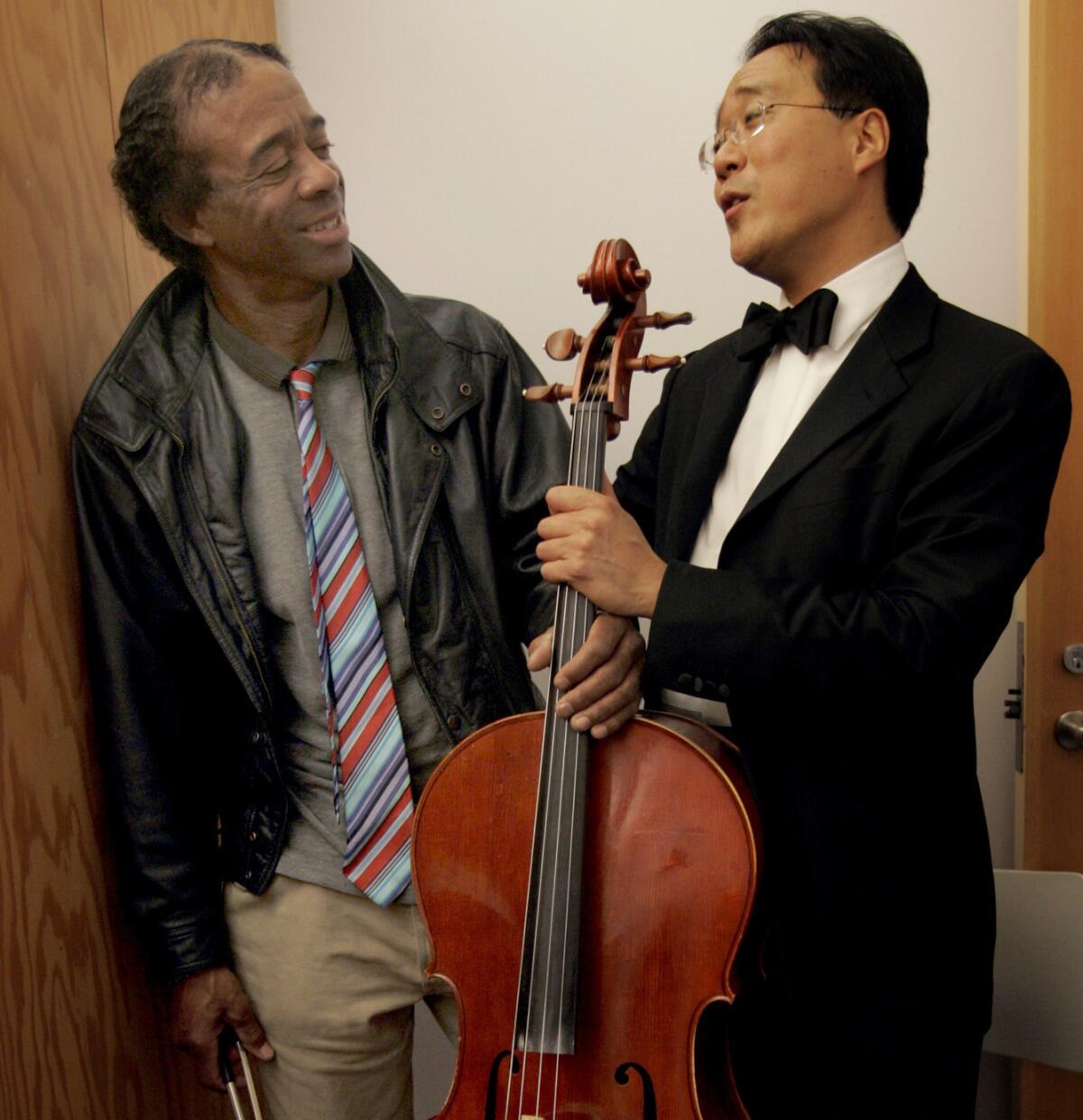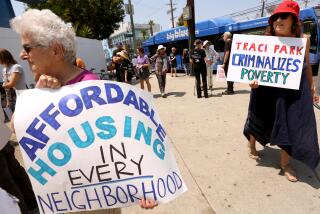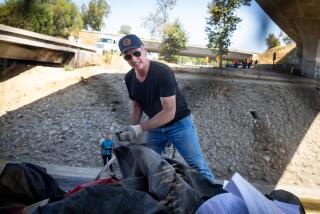Trump brings the battle to California, from homelessness to auto emissions

Good morning, and welcome to the Essential California newsletter. It’s Wednesday, Sept. 18, and Julia Wick is on assignment. I’m Shelby Grad. Here is what’s happening around California:
It’s Trump time: President Trump arrived in California for a fundraising tour but stayed on what has become his favorite new topic: the homelessness crisis in L.A., San Francisco and other cities. He delivered more rhetoric than specific policies. A sample from Trump: “We can’t let Los Angeles, San Francisco and numerous other cities destroy themselves by allowing what’s happening. They can’t believe what’s happening.”
-- Yes, Trump and California officials see the homelessness crisis very differently. New York Times
-- Meet the L.A. mega developer opening his Beverly Hills mansion to Trump. Los Angeles Times
-- Meanwhile, there is confusion in L.A.’s South Bay over an office building the Trump administration appears to want to turn into a homeless shelter. Los Angeles Times
-- And a key test is here about whether more homeless housing will come to the San Fernando Valley. Los Angeles Times
In many ways, Trump’s homeless gambit was far from his most important policy decision Tuesday. The administration signaled it planned to revoke a decades-old rule that empowers California to set tougher car emissions standards than those required by the federal government — putting the state and the administration on a path to years of fighting in court.
So, what is the political motive? Here’s one theory.
‘The Soloist’ A bittersweet sequel
A decade ago, the story of a newspaper columnist and the homeless musician he met on the streets of downtown L.A. seem destined to be a heart-warmer. In the Hollywood movie version, Steve Lopez was played by Robert Downey Jr. and the homeless man, Nathaniel Anthony Ayers, was portrayed by Jamie Foxx. There was a good tale about their improbable bond. Ayers would end up playing at concert halls and meet musical greats as well as President Obama.
But the story didn’t have a Hollywood ending. It’s a complex, twisted story that, like L.A.’s homelessness crisis, can break your heart but also leave you feeling uplifted.

Steve writes about Nathaniel’s continuing problems in a remarkable column and connects it to the larger issues.
“Nathaniel Anthony Ayers showed me a world I knew little about. I thought I could help him, shine a light and show the way for others. I was naively confident the powers that be would respond with whatever it took to do the right thing, the humane thing for all the Nathaniels out there.
What a fool I was.
Almost 15 years later, Nathaniel lives in a locked mental rehab facility, and the rest of us live at the center of an epic collapse of care and a failure of leadership.”
This is a story Steve has been telling for several years as Nathaniel has struggled.
“I’ve got my problems, but I wanna be free,” he told Steve in 2014 in a hopeful moment.
A year later, Nathaniel was enjoying Handel’s Messiah on skid row, an inspiration to other homeless performers.
The situation is more grim three years later: “It breaks my heart to see Mr. Ayers behind locked doors, and I know that mental institutions are far from perfect,” Steve wrote. “But I feel a sense of comfort in knowing he’s safe and housed.”
Steve ends his latest with a question many in L.A. have asked as the homeless crisis has exploded: “I wonder if there will be a time when we do the basic things a caring, civilized people do.”
One reader was moved to offer a personal story to Steve:
“I can’t help myself. I too have a Nathaniel story.
I will keep this brief.
I was a young bride back in 1962. We had bought a starter home in 1964 out in the Santa Clarita Valley. By 1971, I was pregnant with our fourth child. My husband worked in the retail food industry. During a work stoppage, he came home one night and started accusing me of being in on some sort of coupon scam. Things got continuously worse. I was threatened and hit. In desperation, I wrote a letter to the head of the Retail Clerks Union Local 770 describing my husband’s behavior. I can’t remember the man’s name from the union, but he came to see me and helped me get some help for my husband, My husband was diagnosed as a paranoid/schizophrenic. After a 2-week stay at a mental hospital, he was released and sent back home with medication (Thorazine) that turned him into a zombie. He quit taking his medication and seeing his doctor. He had a gun and began chasing red Mustang cars. I felt that I had no choice but to seek divorce. I went to work and raised our four sons without any financial help from him or any form of government. He returned home to his parents and lived there until they died. He then began living in his car in the Canoga Park area of the San Fernando Valley, where I believe he still lives today. Our children grew up without a father, they saw little of their mother as I was working 40 hours a week with all of the overtime I could get. Our family was forever altered. The mentally ill and their families have been forgotten after then-Gov. Reagan closed the mental hospitals. I don’t know if the mental hospitals or any government housing programs would help people with this disease. I don’t have the answer, but I do know that there needs to be a better answer to this homeless problem.”
L.A. STORIES
Prominent Democratic donor and LGBTQ political activist Ed Buck was arrested Tuesday and charged with operating a drug house, with prosecutors calling him a violent sexual predator who preys on men struggling with addiction and homelessness. Los Angeles Times
A Chinese woman was arrested in Spain and charged with paying the mastermind of the college admissions scandal $400,000 to ensure her son was admitted to UCLA as a phony soccer player, federal authorities in Boston said Tuesday. Los Angeles Times
Another horse death: Less than two weeks before the start of perhaps the most important race meeting in Santa Anita’s history, there was a fatality during training Monday at the Arcadia track. Los Angeles Times
How some of L.A.’s classic neighborhoods got their names. Curbed Los Angeles
From Yale to the streets of L.A. ABC 7
POLITICS AND GOVERNMENT
San Jose became the biggest U.S. city to ban natural gas. But other places are likely to follow. Mercury News
Gov. Gavin Newsom’s handling of the vaccine bill — which was watered-down at the last minute — has done him some political harm. Sacramento Bee
CRIME AND COURTS
The number of people caught trying to cross the U.S.-Mexico border illegally fell 43% — from 5,884 to 3,326 — from May to August in the San Diego area. San Diego Union-Tribune
Who is the Mexican tycoon at the center of a boating tragedy? Los Angeles Times
CALIFORNIA CULTURE
Constance Wu is shaking up Hollywood, and it’s long overdue. The New Yorker
Being an annual Disneyland pass holder makes you do some strange things. Orange County Register
Lawyers are playing doctors in Hollywood’s biggest labor battle. Los Angeles Times
CALIFORNIA ALMANAC
Los Angeles: sunny, 81. San Diego: sunny, 74. San Francisco: scattered showers, 71. San Jose: scattered showers, 75. Sacramento: scattered showers, 79. More weather is here.
AND FINALLY
“California, where the spring comes in the fall and the fall comes in the summer and the summer comes in the winter and the winter never comes at all.”
— — Inez Haynes Irwin
If you have a memory or story about the Golden State, share it with us. (Please keep your story to 100 words.)
Please let us know what we can do to make this newsletter more useful to you. Send comments, complaints, ideas and unrelated book recommendations to Julia Wick. Follow her on Twitter @Sherlyholmes.
More to Read
Sign up for Essential California
The most important California stories and recommendations in your inbox every morning.
You may occasionally receive promotional content from the Los Angeles Times.











